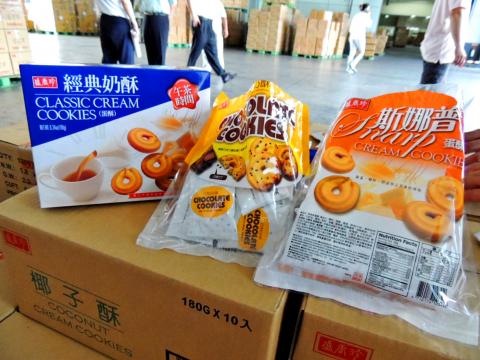People should eat more vegetables and fruits as well as drink plenty of water if they are afraid of consuming products containing swill mixed with various other oils produced and sold as lard, toxicology experts said.
Following edible oil industry crises in October last year, the industry has again been shaken after Pingtung County received tips of a factory manufacturing tainted oil, allegedly headed by Kuo Lieh-cheng (郭烈成), whose company reportedly reclaimed oil from kitchen waste as well as grease out of leather processing plants, and sold the final product to Chang Guann Co (強冠企業).
The Food and Drug Administration’s investigation into the case so far suggests that Kuo mixed his products in a 1:1:3 ratio, using one part each of recycled oil and three parts of lard per mixture.

Photo: Ou Su-mei, Taipei Times
Linkou Chang Gung Memorial Hospital department of clinical toxicology director Yen Tsung-hai (顏宗海), said that the swill was easily oxidized, and that due to the unsanitary location where it was processed, may contain large amounts of germs, aflatoxin and benzopyrene, the latter two of which are carcinogenic.
Though swill commonly refers to liquid waste, in this instance it specifically refers to recycled oil collected from various sources such as kitchen fryers, restaurants and grease traps.
Yen also said that if oils from leather fabrication were used, depending on whether the leather had been dyed, minute traces of heavy metals such as chromium or arsenic may be present, adding that such materials often damage the livers and kidneys.
Yen said that eating vegetables would help the body rid itself of aflatoxin, adding that fruits rich in vitamin C would also help expel benzopyrene.
Separately, colon and rectal surgery expert Wang Jaw-yuan (王照元) said that whether the case has direct correlation with Greater Kaohsiung’s and Greater Tainan’s surge in death rates of patients with colon and rectal cancer over the past years required further research.
Meanwhile, Consumers’ Foundation secretary-general Lei Li-fen (雷立芬) yesterday said the government had failed to ensure that manufacturers check products themselves or send them for independent inspection.
Lei said that Chang Guann Co had been honored with an award from the General Chamber of Commerce.
According to Lei, the government or business groups, while bestowing awards on manufacturers, have not been rigorous in checking if the enterprises have carried out their social responsibilities.
These, she said, are the reasons why major food companies like Wei Chuan Foods Corp (味全食品工業), one of the nation’s oldest and biggest food enterprises, have been involved in food scandals.
Lei also faulted consumers for their weak responses to the scandals, which she said allowed food enterprises to consider only their own interests and profits and ignore the need for establishing proper safety controls.
Additional reporting by Huang Chia-lin, Lin Hui-chin and Huang Yi-ching

The Taiwanese passport ranked 33rd in a global listing of passports by convenience this month, rising three places from last month’s ranking, but matching its position in January last year. The Henley Passport Index, an international ranking of passports by the number of designations its holder can travel to without a visa, showed that the Taiwan passport enables holders to travel to 139 countries and territories without a visa. Singapore’s passport was ranked the most powerful with visa-free access to 192 destinations out of 227, according to the index published on Tuesday by UK-based migration investment consultancy firm Henley and Partners. Japan’s and

NATIONAL SECURITY THREAT: An official said that Guan Guan’s comments had gone beyond the threshold of free speech, as she advocated for the destruction of the ROC China-born media influencer Guan Guan’s (關關) residency permit has been revoked for repeatedly posting pro-China content that threatens national security, the National Immigration Agency said yesterday. Guan Guan has said many controversial things in her videos posted to Douyin (抖音), including “the red flag will soon be painted all over Taiwan” and “Taiwan is an inseparable part of China,” while expressing hope for expedited “reunification.” The agency received multiple reports alleging that Guan Guan had advocated for armed reunification last year. After investigating, the agency last month issued a notice requiring her to appear and account for her actions. Guan Guan appeared as required,

Japan and the Philippines yesterday signed a defense pact that would allow the tax-free provision of ammunition, fuel, food and other necessities when their forces stage joint training to boost deterrence against China’s growing aggression in the region and to bolster their preparation for natural disasters. Japan has faced increasing political, trade and security tensions with China, which was angered by Japanese Prime Minister Sanae Takaichi’s remark that a Chinese attack on Taiwan would be a survival-threatening situation for Japan, triggering a military response. Japan and the Philippines have also had separate territorial conflicts with Beijing in the East and South China

A strong cold air mass is expected to arrive tonight, bringing a change in weather and a drop in temperature, the Central Weather Administration (CWA) said. The coldest time would be early on Thursday morning, with temperatures in some areas dipping as low as 8°C, it said. Daytime highs yesterday were 22°C to 24°C in northern and eastern Taiwan, and about 25°C to 28°C in the central and southern regions, it said. However, nighttime lows would dip to about 15°C to 16°C in central and northern Taiwan as well as the northeast, and 17°C to 19°C elsewhere, it said. Tropical Storm Nokaen, currently